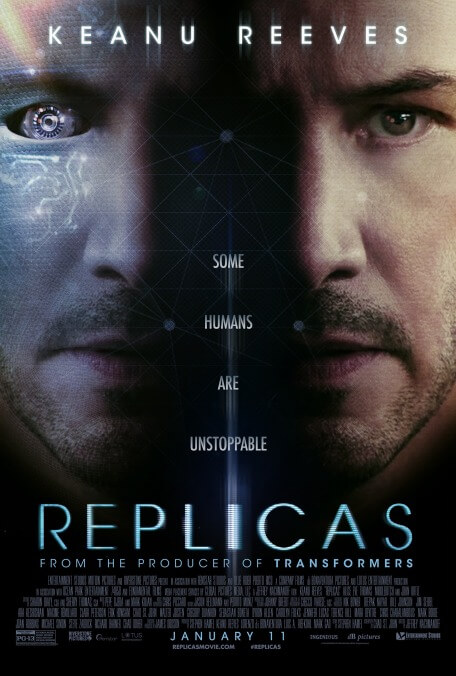The Keanu Reeves sci-fi movie Replicas is so terrible it could give you an existential crisis

Replicas, the astonishingly inept new Keanu Reeves vehicle, plays less like a science-fiction thriller than some malfunctioning computer’s unconvincing approximation of one. If you woke up in a glitching simulation, this janky garbage would be projected on every screen, possibly under the title Human Movie. One could be forgiven for wondering if it is a real film. The poster, after all, with its bifurcated headshot and nonsensical tagline (“Some humans are unstoppable”—whatever that means), is the type of thing you might see hanging on the wall of a fictional producer’s office in a bad Hollywood satire. The distributor, meanwhile, is the hilariously fake-sounding Entertainment Studios Motion Pictures, while the production company is called, no joke, Company Films.
Actually sitting through Replicas—whose plot makes no sense, whose effects look unfinished, whose dialogue sounds suspiciously like the attempt at chitchat by a poorly programmed AI—doesn’t make it seem much more real. This is a movie so terrible you can hardly believe it exists. In what qualifies, by default, as the most plausible element of the film, Reeves stars as a neuroscientist, Will Foster, who manages to clone his family after a fatal (and clumsily staged) car accident, inserting their memories into rapidly gestating new bodies. Because he has access to just three incubation pods, Will can only bring back his wife (Alice Eve) and two of his children, which means he also has to scrub away all their memories of the third kid—a pseudoscientific task that this pseudo-movie depicts as a simple click-and-delete process, like Eternal Sunshine by way of iMovie.
The premise is derivative but not unpromising; in the right hands, this could be a true Philip K. Dick nightmare. But in Replicas, everyone approaches the monkey’s-paw riff they’re trapped in with a nonchalance bordering on the sociopathic: Rarely have characters in a sci-fi movie crossed boundaries of reality and ethics so casually, comically underreacting to every tragedy and miracle. Will, who works at a generic research company called Bionyne, constructs his homemade cloning station with the help of a fellow scientist played by Thomas Middleditch, projecting the put-upon indignation one might expect from a coworker sick of being asked to cover a shift. (“Well, see you at work,” is his blithe farewell after the experiment succeeds.) Will, on the other hand, comes across less like a bereaved mad scientist than a bumbling crook, stealing car batteries from his neighbors to power his basement lab and carrying out text-message conversations with his dead daughter’s friends.
The script resembles what you might get if you plugged random lines of synopsis from a dozen experiment-gone-awry potboilers into a faulty algorithm. (The true culprit: London Has Fallen and Peppermint screenwriter Chad St. John, whose body of work is awful enough to make you wonder if his name is just being slapped on disowned projects, à la Alan Smithee.) There are strong hints of unintentional comedy in the film’s extremely padded-out second act—just one quality that marks it as ideal MST3K fodder. Another would be the prevailing Ed Wood-for-the-21st-century vibe: Shot in Puerto Rico, but set almost exclusively in a nondescript suburban home and underdressed laboratory, Replicas has all the production value of an embezzlement scheme. On what could the $30 million it allegedly cost possibly have been spent? Certainly, it didn’t go into the special effects, which reach a nadir of Syfy-grade chintziness during the film’s nominally action-packed climax.
Meanwhile, director Jeffrey Nachmanoff somehow manages to coax worse performances from his actors than what he might have gotten out of CGI avatars of them: Eve comes across like a stilted Stepford Wife automaton even before the character is brought back in test-tube form, while John Ortiz, cast as the slimeball corporate villain, delivers his lines as if he’s memorized them phonetically. The easy joke here is that everyone is matching their costar’s signature flat affect—that robotic quality that’s made the action hero the butt of jokes his whole career, and which Replicas eventually makes amusingly literal. But truthfully, and for once, Reeves is the most human presence on screen, trying and nobly failing to wrestle some emotional truth from every preposterous new plot twist. His labor is the one proof that you’re watching a real movie, and not just being plugged into the low-grade imitation of one in a poorly coded Matrix.